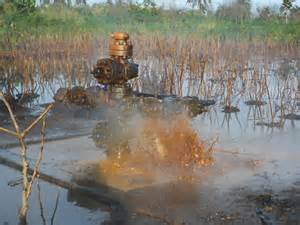Despite the severity of the findings of the environmental assessment of Ogoni environment by the United Nations Environment Programme (UNEP) four years ago, very little has been done by way of implementation of its recommendations, the Health of Mother Earth Foundation (HOMEF) has said.

In a media statement on Monday, the group said that the response of the administration of former President Goodluck Jonathan was the setting up of the Hydrocarbons Pollution Restoration Project (HYPREP) whose “anachronistic” name and its being domiciled in the Ministry of Petroleum Resources (a key polluter) effectively rendered it dead on arrival.
“The HYPREP was set up a year after the UNEP report had been issued and its most visible accomplishments have been the installation of billboards on oil theft and ubiquitous signposts in Ogoni communities to keep off their contaminated communities. Perhaps the only salutary step may be the ongoing consultations on what to do about the UNEP report a full four years after the fact of its submission,” says HOMEF director, Nnimmo Bassey.
He recalls that President Buhari pledged that his administration would implement the UNEP report, adding that this fourth anniversary is a good time for the Federal Government to commence the process in a more tangible manner indicating the grasping of the emergency nature of the toxic environment in which the Ogoni people have been forced to live in.
“Provision of potable water remains a key emergency requirement in this situation. We note that while the UNEP Report on Ogoniland is yet to be addressed, other communities in the Niger Delta, notably the Egi community in Rivers State, have demanded for a ‘Forensic Environmental Audit of Egi Land’,” Bassey notes.
In a letter dated 14 July 2015 and addressed to President Muhammadu Buhari and copied the United Nations Human Rights Council, the Egi Joint Action Congress (EJAC) states, among others, that they are “host to Total Elf Petroleum Nigeria Ltd (TEPNG). With about 12.5% of the total on-shore oil production of Nigeria, Egi Land is the highest oil producing community in Rivers State, and in Nigeria.”
An accompanying report by EJAC regrets that “TEPNG having contributed largely to the environmental and socio-economic destruction of Egi Land by its oil and gas activities over the period 1964 to 2015, as a result of insincerity in carrying out its social responsibilities, is reportedly making surreptitious efforts to divest its equity interest apparently to a foreign company, without due regard to the sorry state it has plunged Egi Land.”
A community leader, M.T. Igwe, says: “It is glaring that exploration of mineral resources brings wealth and prosperity to the nation but to the Egi man it brings destruction, doom and death, marginalisation, degradation and hazards.”
HOMEF notes that the cry of the Egi people against land grabbing in their communities, gas flaring, oil spills and waste dumping are emblematic of all other communities ravaged by oil exploitation related environmental incidents. The EJAC report states for instance that the environmental damage caused by an oil/gas blowout at Obagi in 1972 is yet to be remediated a full 43 years after, the group adds.
“As we mark a sad passage of four years of inaction on the UNEP report, we believe that further delay will be immoral, unkind and cruel,” says Bassey.
“President Buhari has a golden opportunity to fulfil his campaign promise to implement the UNEP report and should do so expeditiously. The call for a forensic environmental audit of Egi Land should also be responded to with a Niger Delta wide environmental audit and consequent remediation. Further delay passes a death sentence on both the land and the peoples of the region. Just as the polluter Shell Petroleum Development Company paid for the assessment of the Ogoni environment, Total Elf Petroleum Nigeria Ltd should pay for the assessment of the environment of Egi Land. Likewise should Chevron, ExxonMobil and others in their territories of despoliation,” Bassey stresses.
